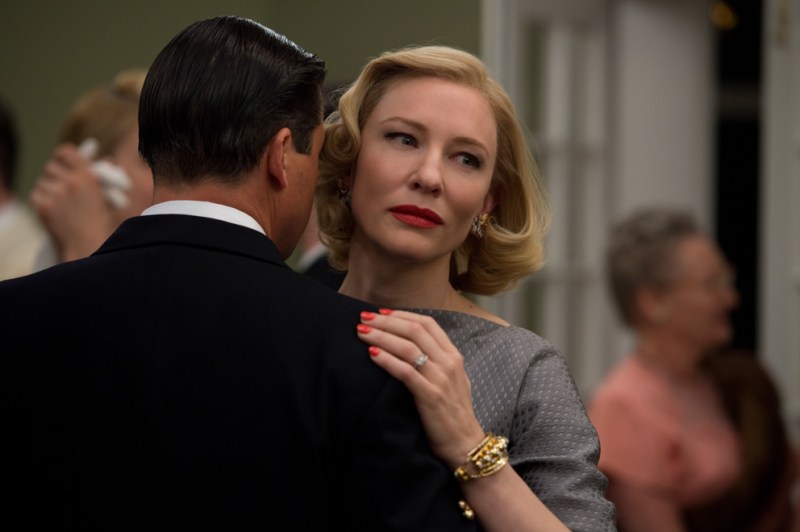From “Carol” to “Sicario,” here are film critic Will Ferrer’s picks for 2015’s best.
- “Carol”
“Carol” is a film that is made in the details: the color of the eponymous Ms. Aird’s (Cate Blanchett) nails as department store worker Therese Belivet (Rooney Mara) floats into her life and away again; the ecstatic quasi-maternal whisper (“I like the hat”) of one woman to another amid a crowded sales floor at Christmastime; the heaving of wet hair over a naked shoulder. A movie of near-imperceptible pleasures, “Carol” is perhaps too ephemeral to treasure in one sitting, but, with time, the textures of director Todd Haynes’s ode to Sirkian melodrama emerge, revealing what is certain to be this year’s most authentic romance. Like snapshots captured from train windows, “Carol” is an exquisite study in collisions and divisions: of strangers enfolding and unfurling, liberated yet enclosed on all sides.
- “Steve Jobs”
An operatic character study in three parts, “Steve Jobs” roars with passion and verve, buoyed by the brilliance of two cinematic maestros, both firing on all cylinders. For his part, screenwriter Aaron Sorkin (“The West Wing”) brings wit and speed to the iconoclasm of Apple co-founder and CEO Steve Jobs (Michael Fassbender), diving into the fallacies of the digital and the frigidity of man in the age of machines. Paired with Danny Boyle — the king of stylistic bombast, Sorkin manages to match the unfettered fury of “The Social Network” while infusing his critique with sentiment. As Steve Jobs’s right-hand woman, Kate Winslet just about steals the program (two words: “Fix it!”), but its the trio of actresses (Makenzie Moss, Ripley Sobo,and Perla Haney-Jardine), who together portray Jobs’s daughter Lisa, who allow “Steve Jobs” to transcend the tropes of the heartless anti-hero tale.
- “Spy”
Melissa McCarthy is often typecast as the “overweight psycho” and the ensuing antics are less-than-riveting (see: “Tammy,” “Identity Thief”). As an actress, however, McCarthy demonstrates impeccable comic timing and range – and in no place is it more evident than Paul Feig’s “Spy.” Easily the most quotable movie of 2015 (“I mean, you may never be as wise as an owl but you’ll always be a hoot to me”), “Spy” burns along with unparalleled manic energy, perpetually re-inventing itself, daring to do that which is neither predictable nor simple. Released months prior to “Spectre,” “Spy” is also a wonderful foil to the chauvinistic and tiresome Bond franchise. In “Spy,” sexist tropes fall to pieces left and right, proving that blockbuster feminism can be about more than just picking up the weapon when the male lead fumbles.
- “Sicario”
Denis Villeneuve’s “Sicario” was possibly the most talked about film of the Toronto International Film Festival, but turned off by early reviews, I failed to secure a ticket. Months later, I caught “Sicario” on its way out of theaters, and I left cursing the interwebs for spoiling one of 2015’s finest.
Devilishly good, Villeneuve’s follow-up to his underrated and overlong “Prisoners” plays like one unforgiving setpiece; the clock keeps ticking (or in this case, Jóhann Jóhannsson’s bone-chilling score) and the heart never stops pounding as Emily Blunt’s Agent Macer stumbles through the nine circles of Hell and back. What makes “Sicario” more than just this year’s best action movie, however, is its haunting indictment of the boundlessness of male violence. Corpses decay in drywall, cadavers hang from bridges, families fall face down in their peas: For Villeneuve, machismo brutality is the most repulsive of gifts – and it just keeps giving.
- “Mistress America”
It only seems fair to name “Mistress America” my favorite film of the year, considering the number of times I have watched and re-watched it since its August release (seven, if we’re counting). Clocking in at just under 90 minutes, Noah Baumbach and Greta Gerwig’s latest is a film that demands repeat viewings. The screenplay – penned by Baumbach and Gerwig – is packed with brilliant jokes and faux-pretentious witticisms (on television: “I hear its the new novel”) that play less like mean-sprited satire and more like a series of half-hearted apologies for millennial culture. Set in the streets of New York City (where the film’s screwball leads, Gerwig and Lola Kirke, live and work) and Greenwich, CT (where a crystal-ball-induced detour later transports the central pair and their entourage of halfwits), “Mistress America” is the first movie to truly capture the 2000s-era American dream and all its associated neuroses.
Contact Will Ferrer at wferrer ‘at’ stanford.edu.
